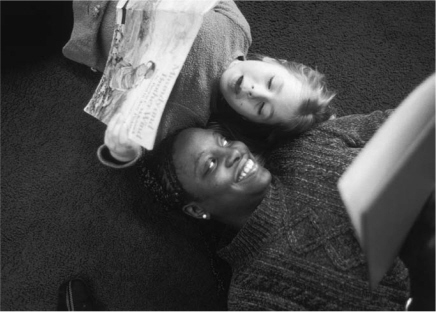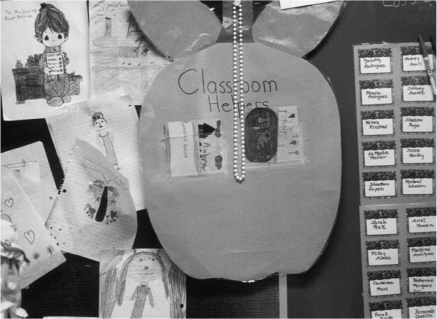Chicken Soup for the Soul Celebrates Teachers (6 page)
Read Chicken Soup for the Soul Celebrates Teachers Online
Authors: Jack Canfield

Jones chose the home-invasion approach.
Dressed in a fluffy white Grinch bathrobe and puppy slippers, the Colorado principal slips into his students' homesânot to steal Christmas, but to read bedtime stories.
Several evenings each week, Jones visits his students as part of the innovative Goodnight Moon program, which he originated in 1999.
He got the idea from his daughter Jessie who, after being read to one night, told him that it would be nice to hear somebody else's voice. He thought that if Jessie felt that way, then other kids probably did, too.
Since then, he has visited about four hundred homes, sometimes reading to groups as large as fifteen.
Jones's goal is to reinforce the importance and pleasure of reading outside of school.
Reading was always a big part of Jones's family when he was growing up. A former teacher whose wife and three sisters are teachers, he remembers his Grandma Jones reading
Goodnight
Moon
to him when he was a kid. His major inspiration was his dad, a teacher and principal. He grew up understanding that he would never be rich being a teacher or principal, but the rewards far outweigh the lack of pay.
Jones reports that kids think it is cool that the principal would come to their house. They always want to show him their room, introduce him to their brothers and sisters, and show him their pets.
Often, older and younger siblings sit in on story time. Jones usually carries little picture books just in case there are young siblings at his student's home. He always reads to them, and they get to keep their book, too.
The Goodnight Moon program helps children of all ages value reading outside of school; it also models good “literacy behavior” for parents, says Jones, who practices what he preaches. “My wife and I read and do homework with our children, Ryan and Jessica,” Jones says. When he is in his students' homes, the parents also sit in. “I want parents to see what they can do to support reading and what kinds of questions and strategies they can use.”
It's a self-sustaining outcome: The children tell their friends, who tell their parents, who call to invite Jones to read. Kids get fired up about reading, and parents get the tips to keep those home fires burning.
Throw in the milk and cookies, and this just might top Jones's other reading incentive plan. “I was looking for a fresh way to encourage children to read at home. Our students read more than five thousand hours (three hundred thousand minutes) on a âtrip around the world.'” As their reward, a teacher shaved Jones's head at a school assembly celebrating the students and the community.
At least Jones isn't feeling a draft. His staff gave him a robe and Winnie-the-Pooh slippers, which he sometimes wears for readings.
Jones takes about six to eight books to the house, books appropriate for the grade level or individual needs of the child, and the child picks which book he reads. Afterward, he always inscribes the book with a little note to the child and lets them keep the book.
Jones says his greatest reward comes in the hugs he gets from kids, and the thank-yous from parents. All of them thank him and write notes and bring treats and share good books. One former student has even asked him to stand up at his wedding. He relates that this is one of the best things that has ever happened to him in his professional career. He now knows that he had a positive impact on this young man.
Jones's impact may be felt in many classrooms to come. “Hopefully,” Jones says, “my reading to the children will inspire them to read every night, and in the long run this has a positive impact on both the kids
and
the teachers.”
Not to mention the community. For the last two years the Longmont PTA has sponsored a book fair, and in just two years members of the community have donated more than two hundred books to the Goodnight Moon program.
Teaching is one of the few professions in which you often cannot measure your success until years down the road, Jones notes . . .
if
a student comes back as an adult and says thanks. Yet even if students don't return, their teachers' impact is certain.
“Teachers need to be recognized for the outstanding things they do, every day, for kids. I hope that my story inspires teachers to keep doing what I believe to be the most important profession in the world.”
 Maria D. Laso
Maria D. Laso

Bulletin boards are a must, you may know;
You've got to have something right up there to
show,
So if a proud parent, or some school official
Should drop by to visit, they'll give a soft whistle
And say to you later, “I simply
adored
Your interesting, colorful bulletin board!”
The very first year that ever I taught
I knew that if I was to be worth my salt,
I'd have a perpetual, wondrous sight
All painted and pasted up there to look bright
And make it look like we did really great stuff
All day in the classroom. As kids say, look “tough.”
I forged right ahead with a,“Come on! Let's go!
It's time for the bulletin board thing, you know!”
I heard some low groans and some dirty words, too;
My bulletin board kick was
not
getting through.
Then somebody snickered . . . out loudâso I'd hear,
“It was just one big bulletin board all
last
year!”
Well, it wasn't just then I dared do my thing;
I was simply too new to try out my own wings.
But before very long I was all up to
here
With bulletin boards, and I got this idea.
We had a traditional board on the wall
With pictures of authors we'd studied, and all.
It was time for a change, so I grabbed up a rose
That some boy'd brought me, and up on my toes
I ripped off the old, and with no reservation
I stapled that rose to the boardâa sensation!
Then I picked up a part of a pencilâall splitâ
Right up on the board with Scotch tape, and it fit!

A broken broom handle tied up the next place,
A messed-up eraser that wouldn't erase.
By now, all the students had got in the swing,
And all of us bulletin-boarded our thing.
Part of a love noteâsnatchedâtorn up by me
Went next to the dead rose, significantly,
A dirty blue beanie left under a chairâ
We stapled it up, and it looked good up there.
A cheat sheet (used) next, typed up nice and neat
That somebody went off and left in his seat;
A small vial of perfume, “Pink Passion” the name;
A broken-up comb, and a small checkers game.
Two cards someone lostâa black Jack, a red King
Were next. They went well with the scheme of the thing.
A Superman funny book, big wad of gum;
Then we taped up a rather large Oreo crumb.
It said something REAL, and there wasn't a doubt
Our collage was what everything's
really
about.
You may well suppose that the thing was a mess,
But we loved it and called our board “WONDERFULNESS.”
 Ellen T. Johnston-Hale
Ellen T. Johnston-Hale
A
teacher did a number on my heartstrings with an “end of school year” gift when my daughter Mimi was in the second grade.
It was the first year wheelchair-bound Mimi, a lovable child of very few words, was placed in a homeroom class with “normal” children. Even though she had attended the same elementary school for several years, Mimi had not had the opportunity to mingle much with the regular education students.
Her homeroom teacher, Mrs. Keeling, made her an integral part of the classroom activities very naturally from the first day, and after a few weeks invited me to talk to the students. She called it a “teachable moment” since her students asked questions about Mimi that she couldn't answer. They asked me stuff like, “What does Mimi like to do for fun? What is she saying with her hands?” Although our daughter is not deaf, her classmates learned that special-needs children are often taught sign language to express themselves.
I called the moment a turning point in Mimi's life. I think for the first time her peers thought of her as a “kid in a wheelchair”
instead of a “wheelchair with a kid in it.”
It was a very good school year. Mimi started receiving little notes in her wheelchair backpack from a boy in her class named Joe, often with mazes for her to solve. Because Mimi couldn't read or write, I started sending him notes and signing them with Mimi's name. They often included little tidbits about what Mimi had done over the weekend. I think he knew who was really sending them, but Joe never let on. It wasn't until a couple of years later that I learned from his mother that Joe had been the new kid in class that year and was having a difficult time making friends.